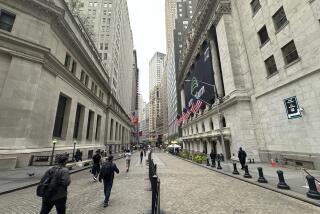STOCKS : Gorbachevâs Ouster Sends Dow Index Tumbling 69.99
Wall Streetâs steep plunge Monday on news of a Soviet coup was led by shares of companies that have the most to lose from another economic slump.
The Dow Jones industrial average tumbled 69.99 to 2,898.03, for a 2.4% loss. But that decline was mild compared to the damage in some market sectors:
* The Dow transportation index slumped 3.6% as airline stocks were hit hard. News of the Soviet Unionâs turmoil fueled fears of a global recession at a time when many airlines have been forced to cut fares because of weak business. New fare cuts were announced Monday.
AMR, parent of American Airlines, dropped 3 1/8 to 57, a 5% loss. UAL, parent of United, lost 4 7/8 to 133 1/4, off 3.5%. Delta gave up 3 3/4 to 63 3/4, off 5.6%.
* Many industrial stocks also were slammed on recession worries, as fears mounted that Soviet strife will depress spending plans of businesses worldwide, causing a snowball effect. The economies of many key nations have only begun to recover from the shock of the Kuwait crisis a year ago.
Among leading multinational industrial firms, GM dropped 1 7/8 to 35 5/8, Ford lost 1 to 29 7/8, Monsanto tumbled 3 1/8 to 69, Clark Equipment fell 1 1/4 to 22 3/8 and Goodyear lost 1 5/8 to 34 1/8.
* Retailers also suffered on worries about consumer spending. The Limited fell 1 1/2 to 26 3/4, Nordstrom dropped 2 to 47 1/2, Sears gave up 1 5/8 to 40 and Dayton Hudson lost 1 7/8 to 72 3/8.
* Damage was also extensive among smaller stocks, many of which had reached record highs in recent weeks. The NASDAQ composite index of smaller issues tumbled 14.83 points to 497.64, a 2.9% loss. The American Stock Exchangeâs composite index lost 7.68 points, or 2.1%, to 358.91.
The Dowâs loss of 69.99 was the steepest slide since Oct. 9, when the index shed 78 points amid worries over the Gulf crisis. That was near the bottom of the 1990 bear market.
A more than 50-point plunge in the Dow early Monday set off the New York Stock Exchangeâs âuptickâ rule, which is designed to prevent a price free fall by limiting computer-driven selling.
Such computerized program trading, keyed to prices on the stock futures market, exacerbated the price drop in early trading Monday, said John Burnett, a trader at Donaldson, Lufkin & Jenrette Securities Corp.
Still, although damage was apparent throughout the market--losing issues trounced gainers 1,555 to 235 on the New York Stock Exchange--volume wasnât close to a record. A total of 230.35 million shares changed hands, compared to 189.48 million Friday.
Stefan Abrams, chief investment strategist at Kidder, Peabody & Co., said stocks were overvalued and ready for a âcorrectionâ in light of sluggish economic growth and a murky outlook for corporate earnings. The Soviet coup provided the impetus for the selloff, he said, even though many U.S. investors probably have few real concerns about the effect of internal Soviet strife on the United States.
On the plus side, experts note that a continuing slide in U.S. interest rates could quickly put a floor under U.S. stock prices. With money funds and other short-term accounts paying so little, investors will continually be pulled back toward stocks to search for better ideas, many analysts say.
Market Roundup, D10
More to Read
Inside the business of entertainment
The Wide Shot brings you news, analysis and insights on everything from streaming wars to production â and what it all means for the future.
You may occasionally receive promotional content from the Los Angeles Times.










